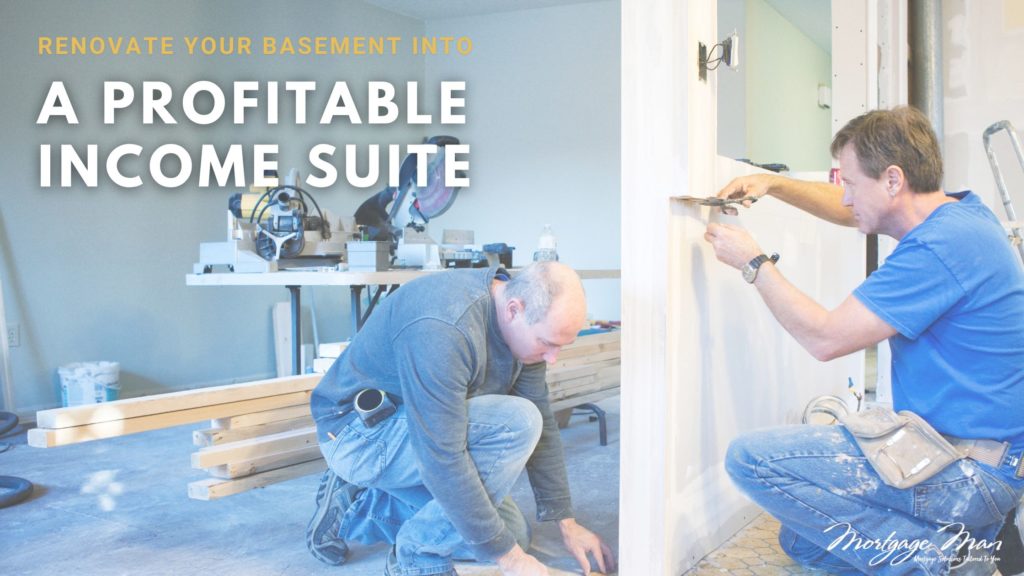Turning Your Basement into a Legal Income Suite: What You Need to Know
With current interest rates and economic uncertainty, many Canadians are looking for ways to bring in extra income. One great option is putting your home equity to work by renovating your basement into a legal income suite. Using a secured credit line, such as a home equity line of credit (HELOC), can help you fund the upfront costs of transforming your space into a money-making asset.
If you’re considering this investment, here’s everything you need to know to get started:
1. Check Zoning Laws
Before diving into renovations, confirm whether your property is zoned to allow for a secondary suite. If it’s not, look into the possibility of rezoning. This step ensures your renovation can proceed without complications.
2. Understand Local Regulations
Income suite regulations vary depending on your city or province. Be sure to consult your municipality’s building department or website to learn about rules specific to your area. For example:
- In Coquitlam: Suites cannot exceed 40% of the main house’s floor plan, and you must provide a designated parking spot.
- In Toronto: Proposed reforms aim to make it easier to add secondary suites.
- In Calgary: Recent zoning changes have made it simpler to add income suites.
- In Montréal: Large renovation projects may require agreements with the city to contribute to affordable housing.
Research these regulations thoroughly to avoid setbacks and ensure compliance.
3. Address Insurance & Legal Needs
Adding a secondary suite means revisiting your homeowner’s insurance policy. Ensure your property will be fully covered, including the new income suite. It’s also important to create a formal tenant agreement if you’re renting out the space. In Ontario, landlords must use the standard lease agreement for all rental arrangements.
4. Plan the Suite Layout
Your income suite must meet specific requirements to be functional and code-compliant. Key considerations include:
- Separate entrance, kitchen, bathroom, and living/sleeping areas.
- Proper ventilation, soundproofing, and natural light.
- Interlinked smoke detectors for the main home and suite.
- Separate heating and ventilation systems.
- Proper utility connections, drainage, and electrical setup.
Hiring professional builders, electricians, and plumbers ensures the suite meets building codes and avoids costly issues down the road. Check out construction-related businesses from the Orillia and District Construction Association.
5. Secure Necessary Permits
Before starting construction, draft blueprints and apply for the required building permits in your area. Even if your region doesn’t require a permit, obtaining one is crucial for ensuring your investment is protected and your suite is considered legal.
You’ll also need permits for plumbing, electrical, and gas work. Failing to secure these can result in delays or fines. Orillia’s building division includes a list of required permits and zoning which can be found here.
6. Schedule Inspections
As construction progresses, ensure you schedule required inspections to confirm the work complies with building codes, fire safety standards, and health regulations. Once the suite passes inspection, it will be officially approved for use.
7. Verify Licensing Requirements
In some cities, you may need a business license to rent out your suite. For instance, Vancouver requires a license for long-term rentals. However, if a family member will live in the suite, a license may not be necessary. Double-check with local authorities to confirm.
8. Take Advantage of Incentives
Renovating for a secondary suite comes with financial perks! Some programs include:
- Multigenerational Home Renovation Tax Credit: Offers 15% of qualifying expenses (up to $50,000) for creating a secondary unit for family members.
- First Nations Programs: Federal funding of up to $60,000 for adding affordable secondary suites, with increased amounts for remote or northern areas.
- Ontario Regional Programs: Forgivable loans of $25,000–$50,000 are available, provided homeowners maintain ownership for 15 years.
Contact your local government or research online for details about programs in your area. The County of Simcoe covers frequently asked questions regarding secondary suites, learn more here.
Why Add an Income Suite?
Creating a legal income suite not only boosts your monthly cash flow but also increases your property’s value. Whether you use the additional income to pay down your mortgage or cover rising costs, this investment can provide long-term financial stability.
Before you begin, visit your local municipal office and consult professionals to ensure you have a full understanding of zoning, permits, and regulations. By following these steps, you’ll set yourself up for a smooth and successful renovation process—and a profitable new stream of income!
Ready to learn more about funding your renovation? Contact us today 705.326.8523 to discuss how to make your home equity work for you!
